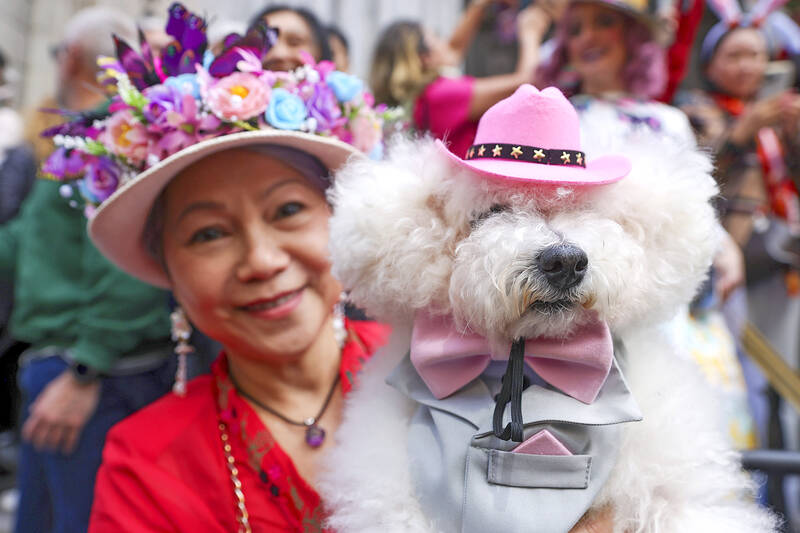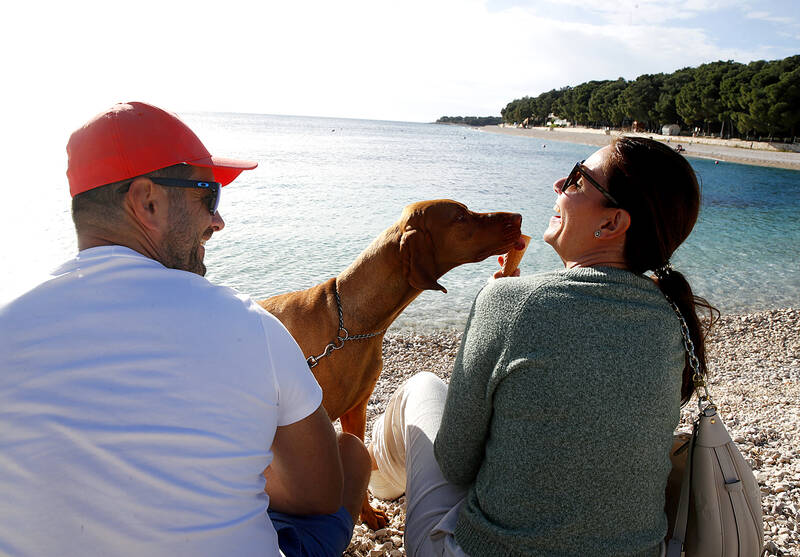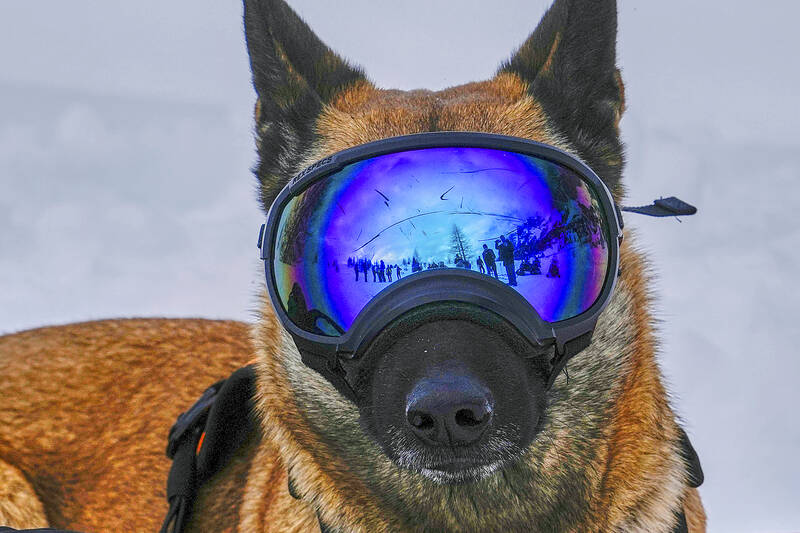Dogs are not simply “fur babies” or best friend but a blend of both, researchers have found in a study they say highlights the special status of pets.
The study suggests owners rate their relationship with their dogs as being as satisfying or more satisfying than their closest human relationships. However, the researchers did not find the owner-dog bond was stronger in people with weaker human relationships.
“Our results showed that it [the bond] does not replace human relationships but offers something different, a unique combination of characteristics to complement what we receive from the human side of our social network,” said Borbala Turcsan, first author of the study from Eotvos Lorand University in Hungary.

Photo: EPA-EFE
Writing in the journal Scientific Reports, the team described how they used social media to recruit 717 dog owners over two periods, from April 2011 to February 2013, and from January 2022 to December 2023. About 20 percent of participants had children and about 80 percent had a romantic partner.
They were asked to rate their relationship with a pet, child, romantic partner, closest relative and best friend on 13 characteristics including companionship, intimacy, reliability, satisfaction and power balance.
Participants were asked how often they protected and looked out for the individual, spent fun time with them, argued and found the individual got on their nerves, as well as how sure they were the relationship would last and who was more dominant.

Photo: EPA-EFE
The team found owners rated their dogs higher for companionship and needing nurture than their closest relative, best friend and romantic partner, while they experienced fewer negative interactions with their dog than with their child, romantic partner or closest relative.
Owners also rated their dogs higher than their best friends and closest relatives for areas including affection, reliability and support. However, when it came to intimacy, romantic partners trumped canines.
And they reported greater relationship satisfaction with their dogs than with their closest kin or best friend. There was little difference in satisfaction when the bond was judged against one with a romantic partner or child.

Photo: AP
But when it came to power, owners’ relationships with their dogs showed the greatest imbalances. The researchers noted that while children were raised to become independent adults, dogs required ongoing guidance and supervision.
“Dogs offer a highly positive relationship with minimal conflict, strong social support, and the unique opportunity to have full control over another living being’s life,” said Prof Eniko Kubinyi, senior author of the research.
Turcsan added that while the dog-owner relationship was most similar to that between a child and a parent, a crucial feature — aside from the power asymmetry — was that dogs had much lower levels of antagonism and conflict with their owners compared to children, something the team noted was similar to best friendships.
While the study has limitations, including that participants were self-selecting, the researchers said the findings highlighted the flexibility of the roles dogs played.
“A dog can be a playmate for children, a good flatmate, best friend for young singles, a surrogate child for young couples, a sibling figure once children arrive, a grandchild for “empty-nester” parents, and perhaps the most important source of social support for elderly people living alone,” said Kubinyi.
Turcsan agreed: “Dogs can be (almost) anything we want them to be.”

June 2 to June 8 Taiwan’s woodcutters believe that if they see even one speck of red in their cooked rice, no matter how small, an accident is going to happen. Peng Chin-tian (彭錦田) swears that this has proven to be true at every stop during his decades-long career in the logging industry. Along with mining, timber harvesting was once considered the most dangerous profession in Taiwan. Not only were mishaps common during all stages of processing, it was difficult to transport the injured to get medical treatment. Many died during the arduous journey. Peng recounts some of his accidents in

“Why does Taiwan identity decline?”a group of researchers lead by University of Nevada political scientist Austin Wang (王宏恩) asked in a recent paper. After all, it is not difficult to explain the rise in Taiwanese identity after the early 1990s. But no model predicted its decline during the 2016-2018 period, they say. After testing various alternative explanations, Wang et al argue that the fall-off in Taiwanese identity during that period is related to voter hedging based on the performance of the Democratic Progressive Party (DPP). Since the DPP is perceived as the guardian of Taiwan identity, when it performs well,

The Taiwan People’s Party (TPP) on May 18 held a rally in Taichung to mark the anniversary of President William Lai’s (賴清德) inauguration on May 20. The title of the rally could be loosely translated to “May 18 recall fraudulent goods” (518退貨ㄌㄨㄚˋ!). Unlike in English, where the terms are the same, “recall” (退貨) in this context refers to product recalls due to damaged, defective or fraudulent merchandise, not the political recalls (罷免) currently dominating the headlines. I attended the rally to determine if the impression was correct that the TPP under party Chairman Huang Kuo-Chang (黃國昌) had little of a

A short walk beneath the dense Amazon canopy, the forest abruptly opens up. Fallen logs are rotting, the trees grow sparser and the temperature rises in places sunlight hits the ground. This is what 24 years of severe drought looks like in the world’s largest rainforest. But this patch of degraded forest, about the size of a soccer field, is a scientific experiment. Launched in 2000 by Brazilian and British scientists, Esecaflor — short for “Forest Drought Study Project” in Portuguese — set out to simulate a future in which the changing climate could deplete the Amazon of rainfall. It is